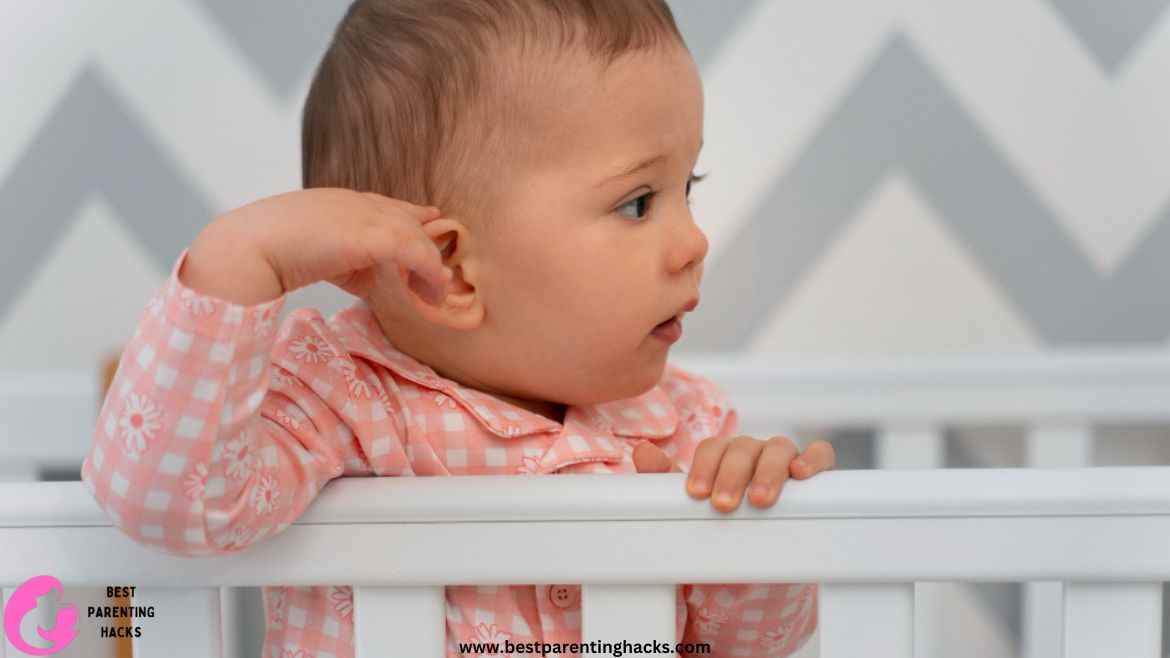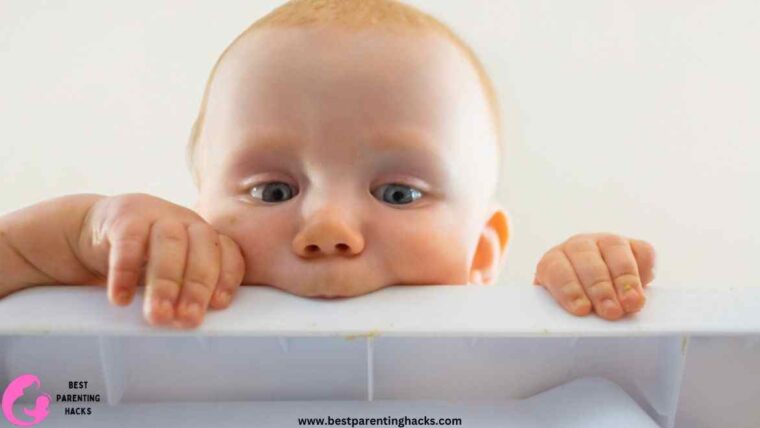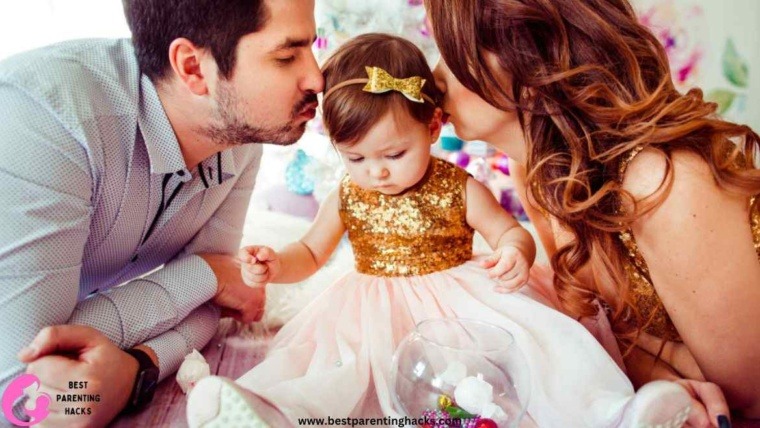Table of Contents
As a parent, I’ve frequently been forced to navigate the enigmatic realm of infant behaviors, attempting to interpret every scream, grin, and gesture. A common activity that baffles and worries parents is when their infant begins to grip their head. Even while this behavior seems harmless, it might raise a lot of concerns and inquiries. Is it an indication of unease? A turning point in development? Or simply a haphazard investigation? It is important to comprehend the subtleties of this conduct to protect our children’s well-being as well as to allay parental worries. Being a mother has taught me that a baby expresses themselves through every movement and gesture giving us a glimpse into their needs and feelings.
The title’s inquiry, “Why Baby Grabbing Back of the Head?” has more than one complex response. It’s critical to realize that this behavior may indicate discomfort or suffering in addition to being a typical developmental stage. Babies operate primarily in an inquisitive manner and are always growing and learning. But if this conduct persists or shows other symptoms of anxiety, there may be a problem that has to be addressed. Exploring this topic further we will delve into the reasons, behind this behavior helping parents better understand and respond to their baby’s needs.
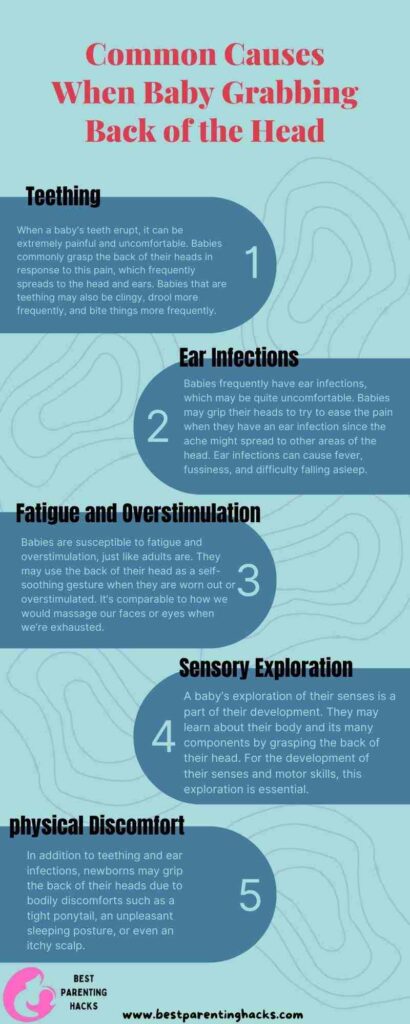
Common Causes for the Behavior
Examining the several things that could cause a baby to grab their head is necessary to understand why they would do so. It’s a kind of communication as well as a reaction to discomfort and physical growth. Here are five important things to think about:
1. Teething: When a baby’s teeth erupt, it can be extremely painful and uncomfortable. Babies commonly grasp the back of their heads in response to this pain, which frequently spreads to the head and ears. Babies that are teething may also be clingy, drool more frequently, and bite things more frequently.
2. Ear Infections: Babies frequently have ear infections, which may be quite uncomfortable. Babies may grip their heads to try to ease the pain when they have an ear infection since the ache might spread to other areas of the head. Ear infections can cause fever, fussiness, and difficulty falling asleep.
3. Fatigue and Overstimulation: Babies are susceptible to fatigue and overstimulation, just like adults are. They may use the back of their head as a self-soothing gesture when they are worn out or overstimulated. It’s comparable to how we would massage our faces or eyes when we’re exhausted.
4. Sensory Exploration: A baby’s exploration of their senses is a part of their development. They may learn about their body and its many components by grasping the back of their head. For the development of their senses and motor skills, this exploration is essential.
5. physical Discomfort: In addition to teething and ear infections, newborns may grip the back of their heads due to bodily discomforts such as a tight ponytail, an unpleasant sleeping posture, or even an itchy scalp.
You Might Also Like to Read: Do Baby Mattresses Expire?
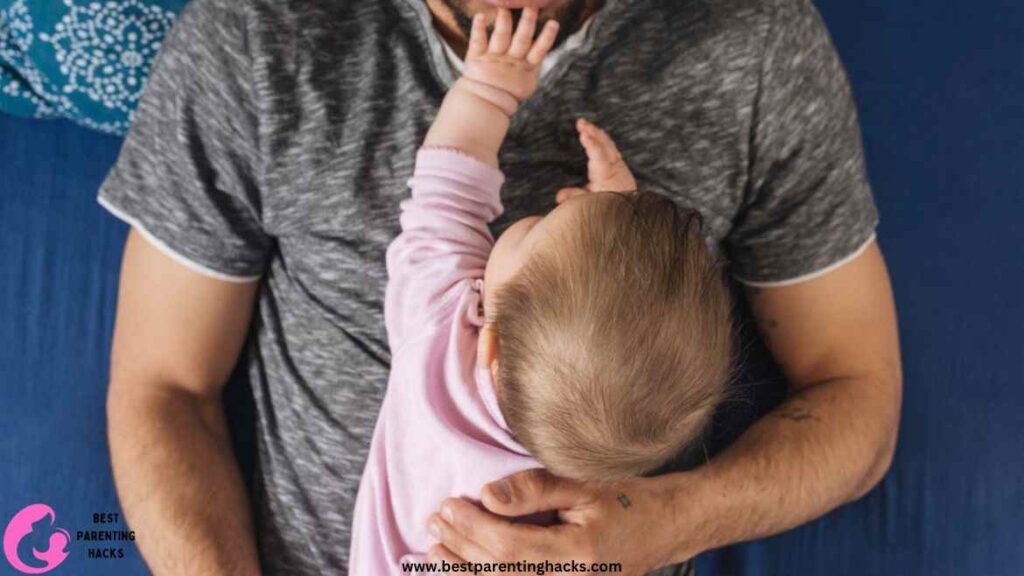
Why Babies Grab the Back of Their Head
I was intrigued and concerned at the same time when I saw my infant clutching the back of their head. Although this behavior might be confusing, babies and toddlers frequently exhibit it. We must consider a baby’s developmental stage to comprehend why they behave in this way. Infants are always curious about their environment, discovering more, about their bodies as they grow. It is crucial for their development, both physically and mentally. As individuals age they start to discover their capacity to maneuver their limbs and engage in activities such, as exploring parts of their body.
Nonetheless, bodily pain or suffering may also be the cause of this behavior. For example, newborns may clutch the back of their head while they are teething because the pain may spread to their ears and skull. In a similar vein, newborns who have frequent ear infections may attempt to relieve their discomfort by caressing their heads. It’s also important to remember that newborns self-soothe in different ways. Holding or massaging the back of their head can provide comfort to newborns, much as adults may stroke their temples when they’re upset or exhausted.
1. Developmental Exploration: Babies use their hands to investigate their bodies out of natural curiosity, which aids in the development of their motor abilities and spatial awareness.
2. Reaction to Discomfort: When experiencing discomfort, such as an earache or teething pain, the back of the head may grip.
3. Self-Soothing Mechanism: Babies may use this mechanism to soothe themselves, particularly if they are worn out, anxious, or ill.
4. Communication of Needs: Babies can communicate their wants and discomforts by physical movements like clutching their heads, while they are unable to express themselves orally.
You Might Also Like to Read: My Baby Was Licking a Battery. What Should I Do?
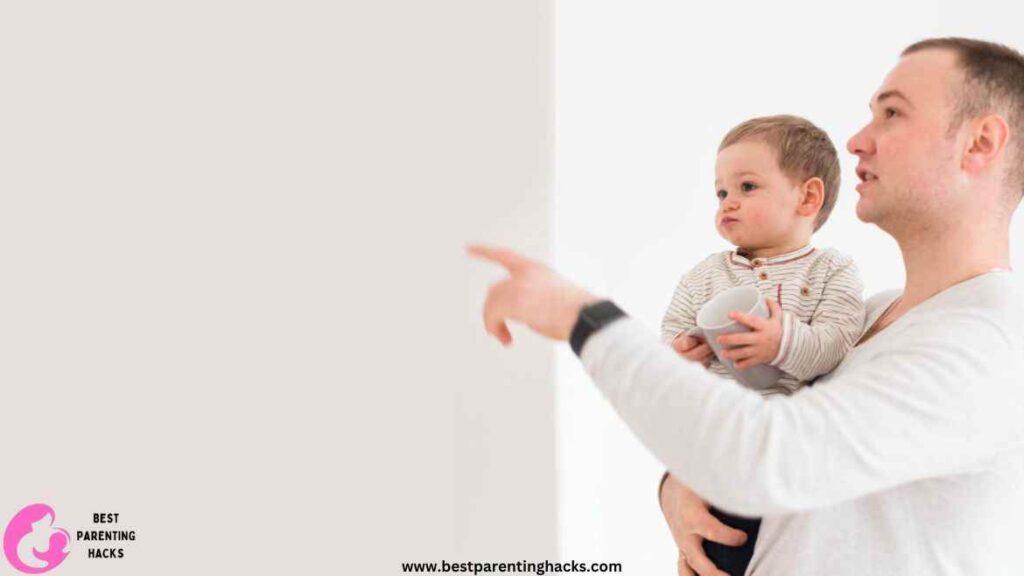
When to Be Concerned: Recognizing Serious Symptoms
It’s normal for parents to be concerned for their child’s health and welfare. Although giving someone the back of the head might be a common practice, there are various indicators that it could be something more serious:
• Persistent and Frequent Behavior: Your baby may be experiencing chronic pain or discomfort if they are grasping the back of their head a lot and appear upset.
• Accompanying Symptoms: Keep an eye out for additional symptoms such as fever, uncontrollable sobbing, adjustments to feeding or sleeping schedules, or indications of an ear infection (such as tugging at the ears).
• Behavioral Changes: Your kid may be in discomfort or unwell if they are less active, angrier, or exhibit other abnormal behaviors.
• Physical Signs: You should see a doctor if you have any redness, swelling, or discharge from your ears, as well as any bumps or bruises on your head.
• Gut Instinct: Have faith in your parents’ judgment. It’s best to see a pediatrician if something feels strange.

Home Remedies and Comforting Techniques
If your infant is grasping the back of their head, you might attempt the following natural cures and soothing methods:
1. Soothing Massages: Your baby’s head, back, and neck can be soothed and comforted by a gentle massage. To help them relax, move in gentle circles.
2. Warm Baths: Taking a warm bath can help reduce discomfort and be calming. Make sure your infant is in a safe and comfortable temperature for the water.
3. Play and Distraction: You may help your baby forget about their discomfort by letting them play with their favorite toys or by getting them involved in light play.
4. Adequate Rest: It’s critical to make sure your infant receives adequate sleep. A sleep-deprived baby is more likely to be fussy and uneasy.
Professional Medical Advice: When to Consult a Pediatrician
Sometimes using at-home treatments won’t be sufficient, and seeking expert medical guidance is necessary. When choosing whether to see a pediatrician, keep the following five things in mind:
1. Persistent Symptoms: A visit to the doctor is necessary if the behavior persists for more than a few days or appears to be getting worse.
2. Accompanying Fever or Illness: When combined with this behavior, a fever—especially if high or prolonged—justifies a trip to the physician.
3. Changes in Eating or Sleeping Habits: If your baby’s eating or sleeping habits significantly shift, there may be underlying problems at play.
4. Unusual Symptoms: A doctor should be seen if you experience symptoms like diarrhea, vomiting, or trouble with your equilibrium.
5. Parental Concern: Follow your gut and see a physician if you’re anxious or have any uneasy feelings.
Preventive Measures and Tips for Parents
To keep your infant comfortable and to make sure they are healthy, take the following proactive measures:
• Consistent Sleep Schedule: Creating a regular sleep schedule might aid in avoiding pain associated with exhaustion.
• Proper Nutrition and Hydration: Keeping your infant well-fed and hydrated can help them be comfortable and healthy.
• Regular Check-ups: Frequent pediatrician visits can aid in identifying and averting any health problems.
• Safe Environment: You can lessen your baby’s risk of pain and injury by providing a safe and cozy environment.
• Observation and Attention: Being mindful of your infant’s demands and actions will enable you to address any problems as soon as they arise.

Conclusion
To sum up, parents need to recognize what might be triggering their baby’s habit of grabbing their head to guarantee their comfort and health. While this behavior is often a part of their curiosity and development it’s essential to be vigilant, for any signs of pain or unease. Recall that each infant is different and has a range of communication styles. You can provide them the support and comfort they need if you are aware of their requirements and respond accordingly. Additionally, never be afraid to see a medical expert when in doubt. Parenting is filled with love and wisdom where even the smallest gestures play a part in creating a journey.
FAQs
1. Why does my baby grip their head when they’re weary?
• Babies may grab their heads as a form of self-soothing behavior when they’re sleepy. It’s how they communicate their weariness and want for solace.
2. How can I help my child feel better when they are in pain?
• Providing a warm bath, giving them a light massage, getting them distracted with their favorite hobbies, and making sure they receive enough sleep are all ways to help a toddler feel better. A quick embrace and some consoling words may also go a long way sometimes.
3. How can I tell if my kid is exhibiting more significant symptoms when they clutch their heads?
• A more serious condition may be indicated if the head grasping persists and is accompanied by a fever, behavioral abnormalities, or other uncommon symptoms. Consult a doctor and follow your gut.
4. may my child grip their head and scream because they are teething?
• Yes, teething may produce discomfort that goes all the way to the head, which can make toddlers grab their heads and cry. Relief can be obtained by giving them teething toys and giving their gums a little massage.
5. How can I keep my toddler’s headache from happening?
• Make sure your toddler eats a balanced diet, drinks enough water, sleeps on a regular schedule, and practices excellent hygiene to avoid headaches. Pediatric checkups regularly are also crucial.
6. Do newborns usually clutch at their heads?
• Babies’ tendency to grab at their heads is a typical component of their growth and sensory exploration. However, it has to be assessed if it occurs frequently and is accompanied by distress.
7. What symptoms could a baby have of an ear infection?
• Pulling at the ear, agitation, insomnia, fever, fluid outflow from the ear, and occasionally a reduction in hearing are all indicators of an ear infection in infants.

